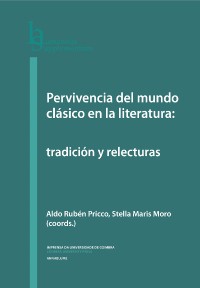Please use this identifier to cite or link to this item:
https://hdl.handle.net/10316.2/90307| Title: | La expresión de la violencia en Medea de Eurípides y en la tragedia argentina Jasón de Alem ania de Javier Roberto González | Other Titles: | The violence expression in Euripides’ Medea and the Argentine tragedy Jasón de Alemania by Javier Roberto González | Authors: | Delbueno, María Silvina | Keywords: | Medea;Euripides;Jasón de Alemania;González;violence;Medea;Eurípides;Jasón de Alemania;González;violencia | Issue Date: | 2017 | Publisher: | Imprensa da Universidade de Coimbra | Journal: | http://hdl.handle.net/10316.2/42874 | Abstract: | From the frame of the literary reception studies, the Medea classic character has been redefined in multiple versions, especially in the Argentine Republic. The tragedy that we will deal with, by Javier Roberto González seems to immerse us
in a reading that, to some degree, subverts masterfully the limit of the foreseeable for a reader subject to the most canonical versions of the classic myth. Since as long as the beginning, the epigraph, extracted from Seneca’s Medea, places the settlement with which this author takes a starting point, a referencing, until getting to demarcate a
scriptural bias, as authentic as appropriate. Far from finding the well known connubial, Medea and Jason characters form the duo: mother and son. The filial relationship starts to plot the trace of a complexity in which the maternal function delineates itself oppressive and omni-phagocytising and, facing it, the son seems to be captive. This relationship might be framed from the declared paternal absence which becomes presence in the iteration of the memory because the son repeats his father´s name in his enunciation. Perhaps that´s why the titling of this work, in which the protagonism holds in the man, the father, the foreigner’s support and not the woman´s any more. Desde el marco de los estudios de recepción literaria, el personaje clásico de Medea ha sido resignificado en múltiples versiones, especialmente en la República Argentina. La tragedia que abordaremos de Javier Roberto González parece sumirnos en una lectura que, en cierta medida, subvierte magistralmente el límite de lo previsible para un lector sujeto a las versiones más canónicas del mito clásico. Ya desde el inicio el epígrafe extractado de Medea de Séneca sitúa el enclave con el que este autor toma un punto de partida, una referenciación, hasta llegar a demarcar un sesgo escriturario, tan auténtico como propio. Lejos de hallarnos con la consabida relación conyugal, los personajes Medea y Jasón forman la dupla: madre e hijo. La relación filial empieza a urdir el atisbo de una complejización en la que la función materna se delinea opresiva y omnifagocitadora y, frente a la cual, el hijo parece estar cautivo. Esta relación podría encuadrarse a partir de la declarada ausencia paterna, ausencia que deviene presencia en la iteración del recuerdo, ya que el hijo repite el nombre del padre en su enunciación. Quizá por ello la titulación de esta obra se sostiene en la apoyatura del hombre, del padre, del extranjero, y no ya de la mujer. |
URI: | https://hdl.handle.net/10316.2/90307 | ISBN: | 978‑989‑26‑1438‑0 978‑989‑26‑1439‑7 (PDF) |
ISSN: | ISSN:2182‑8814 | DOI: | 10.14195/978‑989‑26‑1439‑7_25 | Rights: | open access |
| Appears in Collections: | Pervivencia del mundo clásico en la literatura: tradición y relecturas |
Files in This Item:
| File | Description | Size | Format | |
|---|---|---|---|---|
| la_expresion_de_la_violencia_en_medea_de_euripides.pdf | 603.86 kB | Adobe PDF |  |
Items in DSpace are protected by copyright, with all rights reserved, unless otherwise indicated.
